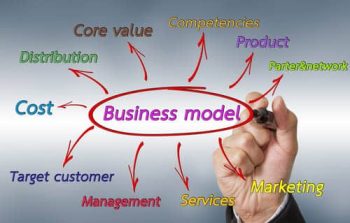Related Blogs
- Using Examples to Create an Impactful Pitch Deck
- Create a business plan for your new business
- Pro forma income statement or how to do it
- Pitch Building: Understanding the Benefits and Choosing the Right Tool
- Financial model as part of the investment track

Even if you don’t think a business plan and business model are necessary, they are still useful because they can help provide structure and direction. They will help your business succeed and will surely provide an ultimate roadmap, approach and tactics to achieve goals in the future.
So whether you are planning or growing your business, you should take the time to write some kind of strategy. In this article, we’ll outline the similarities and differences between a business plan and a business model, and just avoid what these beasts are and why we need to care.
Download the Excel template! Learn even more ⟶
business model
A business model describes your business logic – how your business will become profitable. Great business models develop virtuous cycles that over time lead to competitive advantage. In other words, the business model is the process (even a mini-process) focused on how to get the most money for your startup and generate a potential revenue stream.
For example, you repair smartphones and provide additional services. Your added value is that you repair phones. But your main specificity may be in your ability to add premium services that others do not have. The additional value of these services is twice that of the repair process. This is why the customer comes to you.
This specificity of adding services is an example of a business model. It is based on the main competence of the company. In the end, it’s all about results and what brings you the most money. For example, companies such as Kawasaki make the most money not from producing their motorcycles, but from servicing them. This is their business model. And a business plan is another story.

Good business models develop goals for success:
- Identify and acquire an audience ready to try your product
- Deliver significant value to customers and create competitive benefits and services
- Deliver high margins by having features that deliver great value
This list shows the main factors to define if your model meets the necessary criteria for success and, in the meantime, describes the weaknesses you may have.
What about the business plan
A business plan and a business model are completely different concepts. The business plan gives a written description and more details about a future business. It outlines what steps to take by focusing not just on the business model or how you’re going to realize your idea, but by outlining how your startup will operate – personnel, management, financial stability, and equipment.
Additionally, the business plan outlines the future of your business, as your plan is how you will get from one period to the next – usually three to five years. Overall, the business plan supports the business model and explains the steps to achieve the goals of that model.
Your business plan basically answers these questions:
- Where are you going?
- How are you going to get there?
- How long should it take you?
Primarily, the plan addresses the current year’s goals that you need to achieve to make exercise a success. When answering, you should especially follow the general sections:
Marketing strategy
- Promotional tactics
- Product price
- Brand positioning
Analysis
- Products or services you provide now and in the future
- Market and trends
- Local/foreign competitors and your advantages
- Target audience
Crew
- Structure
- Management
- Administrative costs
Financial section
- Additional funding
- Areas to invest
- Projected revenues in five years
- The income and the cash flow statement
- Financial projection
So what we have at the end:
Similarities
- They both have a common strategy and concept in business.
Differences
- A business model defines the value and process of making money, while a business plan goes further by expanding the vision of the business model.
- The business plan is a documented content with information about the guidelines that we use to explain what we would like to achieve, while the business model is a concept that helps to understand your own project.
- The business plan is for investors, while a business model is more for you.
Final Thoughts
Many entrepreneurs use these definitions synonymously, which can cause poor decision making. A business model is very different from a business plan – it’s more the idea of how you will earn income, and the business plan contains steps you are going to take to accomplish that idea and that vision.
A pattern is more of a destination, and the plan is the road you take to get there. Remember that if you change the business model, you will also need to change your plan.
Have you taken the time to review your business model and plan? We can help your business search and move forward, please don’t hesitate to contact us. We will provide feedback on how to improve your business strategy and create the best business model.
[right_ad_blog]
